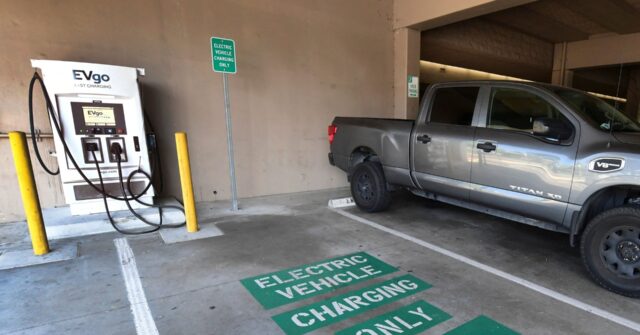Do you have doubts about the wildly touted benefits of trading in your gas powered car for a replacement electric vehicle (EV)? You are far from alone. Plenty of Americans aren’t yet sold on going electric for their next cars, a poll released Tuesday shows.
High prices and too few charging stations are the main deterrents.
About four in 10 U.S. adults are at least somewhat likely to switch, but the making the historic shift from the country’s century-plus love affair with gas-driven vehicles still has a long road ahead, AP reports.
The poll by The Associated Press-NORC Center for Public Affairs Research and the Energy Policy Institute at the University of Chicago shows the Biden administration’s plans to dramatically raise U.S. EV sales could run into resistance from consumers.
Only eight percent of U.S. adults say they or someone in their household owns or leases an electric vehicle, and just eight percent say their household has a plug-in hybrid vehicle.
A group of YouTubers called Fast Lane Truck tested electric and gas-powered trucks to see how far they could haul a trailer, and the results seemed to speak for themselves.
— Breitbart News (@BreitbartNews) July 9, 2022
Even with tax credits of up to $7,500 to buy a new EV, it could be difficult to persuade drivers to ditch their gas-burning cars and trucks for vehicles without tailpipe emissions.
The snapshot of consumer take-up of EV’s comes just days after U.S. President Joe Biden threatened to impose some of the most stringent automobile pollution rules in the world, which are meant to drive up sales of electric vehicles to ten times their current level, so that up to 67 percent of new cars sold in the U.S. are electric vehicles by 2032.
The proposed limits on tailpipe emissions will be brought by the Environmental Protection Agency (EPA), with EPA administrator Michael Regan making the announcement on Wednesday in Detroit, Michigan, as Breitbart News reported.
WATCH: Hurricane Ian Has Turned Electric Vehicles into Ticking Time Bombs … “Extreme Hazard”
The EPA requirements are expected to ensure that electric vehicles constitute between 54 and 60 percent of all new cars sold in the United States by 2030, with that number rising to 64 to 67 percent of new car sales by 2032, the sources added.
But only 19 percent of U.S. adults say it’s “very” or “extremely” likely they would purchase an electric vehicle the next time they buy a car, according to the poll, and 22 percent say it’s somewhat likely. About half — 47 percent — say it’s not likely they would go electric.
Six in 10 said the high cost is a major reason they wouldn’t and about a quarter cited it as a minor reason. Only 16 percent said the high cost would not be a factor in rejecting the EV.
New electric vehicles now cost an average of more than $58,000, according to Kelley Blue Book, a price beyond the reach of many U.S. households.
WATCH: Tesla Driver Left Stranded on Christmas Eve After Battery Refused to Charge
@domnatishow/ AUTO OVERLOAD/TMX
The average vehicle sold in the U.S. costs just under $46,000. Tax credits approved under last year’s Inflation Reduction Act are designed to bring EV prices down and attract more buyers.
But new rules proposed by the U.S. Treasury Department could result in fewer electric vehicles qualifying for a full $7,500 federal tax credit later, the AP report sets out.
The AP-NORC poll of 5,408 adults was conducted Jan. 31 to Feb. 15 using a combined sample of interviews from NORC’s probability-based AmeriSpeak Panel, which is designed to be representative of the U.S. population, and interviews from opt-in online panels. The margin of sampling error for all respondents is plus or minus 1.7 percentage points. The AmeriSpeak panel is recruited randomly using address-based sampling methods, and respondents later were interviewed online or by phone.


